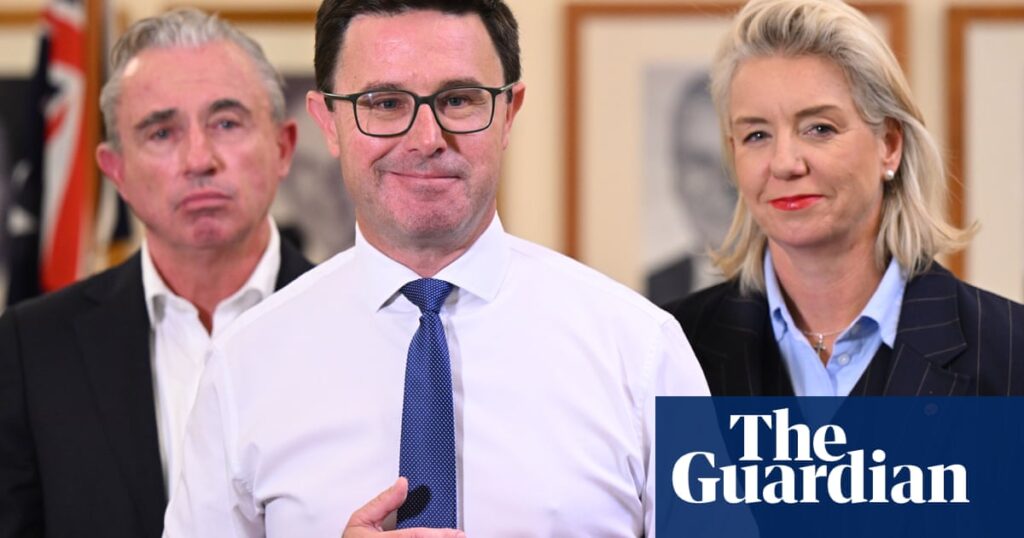The Nationals were divided on the decision to abandon the Coalition, David Littleproud has conceded, as the leader also levelled veiled criticism at Peter Dutton over policy failures during the disastrous election campaign.
Some MPs have publicly called for the Coalition to be reunited, including former leader and Nationals MP Michael McCormack, who told Guardian Australia that he spoke out against the split.
“I spoke against it, and I’m not going to deny that, because I feel, as John Howard does, that Australia is best served under a Coalition government of Liberals and Nationals,” he said.
“But we’ve decided to take a break for the time being … and I accept that decision.”
McCormack said he would continue to advocate publicly and privately for the Coalition to reunite.
Guardian Australia understands Littleproud will allocate portfolios as soon as Thursday with the Nationals set to wage their own arguments on the economy, industrial relations and energy.
The Nationals’ decision to break up the Coalition has sent shock waves through the conservative side of politics, with Howard joined by fellow former Liberal prime minister Tony Abbott in urging a rapid reconciliation.
“History shows that the Liberals and the Nationals win together and fail separately,” Abbott wrote on X.
Negotiations on a new Coalition agreement collapsed after the new Liberal leader, Sussan Ley, refused to immediately sign up to the country party’s policy demands or grant Nationals MPs in shadow cabinet members the freedom to break ranks.
On Tuesday morning, Littleproud communicated Ley’s firm position to colleagues who then agreed to abandon negotiations and blow up the Coalition.
The Nationals did not disclose the result of the party room vote but Littleproud and the deputy leader, Kevin Hogan, conceded on Wednesday that it was not unanimous.
“I think you’d be naive to think any party room would get a unanimous decision,” Littleproud told reporters in Canberra.
Hogan said the party room was “not unanimous but was quite conclusive”.
Littleproud staunchly defended the “principled” decision to cut ties with the Liberals over its refusal to immediately re-commit to positions on nuclear power, a $20bn regional future fund, powers to break up supermarkets, and reliable phone and internet access in the bush.
But on Wednesday night, the reason for the split remained in dispute as Ley swiftly denied Bridget McKenzie’s claim that allowing Nationals shadow cabinet members to vote against shadow cabinet decisions in the parliament was not part of the Nationals’ demands.
Asked on ABC’s 7.30 program if Ley was lying when stating Nationals’ shadow ministers wanted to break cabinet solidarity as a condition of a new agreement, McKenzie said it was “not part of our consideration” and Nationals’ demands were limited to the four policy ultimatums.
“Sussan Ley wasn’t part of our party room discussions. I was,” McKenzie said. “I won’t go into the details of that, but I can categorically tell you why we made the decision we did and what that was based on. It’s why we sought, in writing from the Liberal leader, her guarantee around those four policy areas.”
The 7.30 host, Sarah Ferguson, then shared a statement from Ley’s office in response that said it was “not correct to subject that shadow cabinet solidarity was not a sticking point”.
“And they – that is, Sussan Ley’s office – have that in writing,” Ferguson added.
Earlier on Wednesday, Nationals MP Darren Chester told the ABC the Coalition should be reunited before the next election.
“If we go to the next sitting of parliament being two divided party rooms we are giving a free pass to the prime minister,” he said.
“I would suggest let’s have these conversations sooner rather than later. The longer this goes on, I think it becomes harder to reconcile the differences.”
after newsletter promotion
The break will have major ramifications for senior Nationals MPs, who will lose shadow cabinet positions and the extra pay and staffing numbers that come with them.
Littleproud is expected to allocate portfolios on Thursday or Friday, with the split from the Liberals allowing the Nationals to branch out beyond their traditional areas of agriculture, water, trade, transport and resources.
The split has reopened wounds from the Coalition’s disastrous election campaign.
Littleproud said the Peter Dutton-led campaign failed to combat Anthony Albanese’s “lie” about a $600bn price for nuclear reactors or mount the case that the Coalition’s energy plan would be cheaper than Labor’s renewables-focused approach.
“We couldn’t sell that. We didn’t sell that,” he told ABC’s RN Breakfast.
The Nationals leader also criticised the “fiasco” surrounding the Coalition’s plan to restrict work-from-home for public servants, which was ultimately abandoned mid-campaign after a major backlash.
The junior Coalition partner was blind-sided by the policy, which was not endorsed by shadow cabinet before it was announced.
Guardian Australia has learned senior Nationals were privately seething at the policy, which threatened to disrupt regional families who relied on flexible work arrangements, including to commute from the regions to the city.
In government, the Nationals successfully lobbied for commonwealth public servants and agencies, such as the Murray-Darling Basin Authority, to be shifted to the regions.
The breakup could make it harder to retain Senate seats in Victoria and NSW, where the Nationals run joint tickets with the Liberals.
Even if the parties were not reunited before the next election, due in 2028, Littleproud hinted that state officials could still thrash out a deal to run candidates under the one ticket.
But he acknowledged the threat of losing seats was one of the risks that was weighed up during the party room debate.
“I can assure you that when we had discussions in the party room, all those risks and factors were put on the table,” he said.
“We still got to the decision because you know what? We’re here for a reason.”
